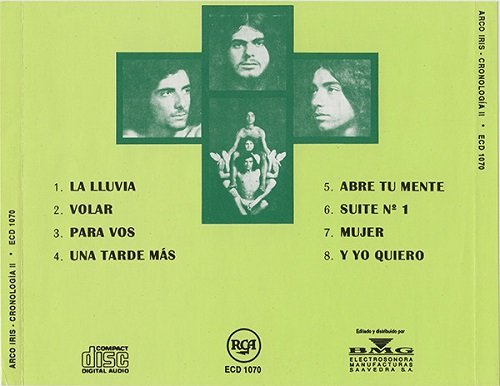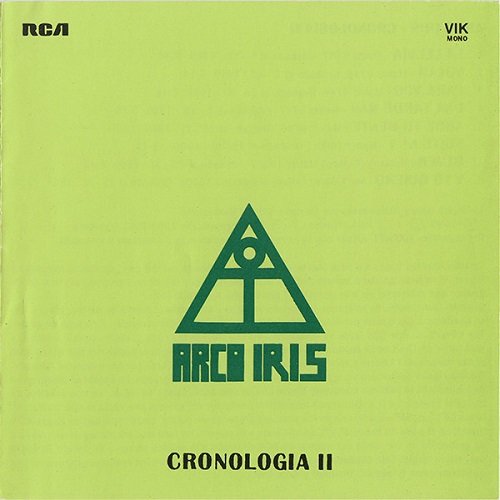
Arco Iris - Cronologia II (1969-71/1992)
BAND/ARTIST: Arco Iris
- Title: Cronologia II
- Year Of Release: 1969-71/1992
- Label: RCA
- Genre: Prog Rock, Art Rock, Jazz Rock
- Quality: Flac (tracks, .cue, log)
- Total Time: 48:19
- Total Size: 307 Mb (scans)
- WebSite: Album Preview

Tracklist:
01 - La Lluvia (matrix 9737, recorded December 1st, 1969)
02 - Volar(matrix 9740, rec. December 3, 1969)
03 - Para Vos (matrix 9744, rec. November 28, 1969)
04 - Una Tarde Más (matrix 9747, rec. December 3, 1969)
05 - Abre Tu Mente (matrix 9746, re. November 28, 1969)
06 - Suite No. 1 (matrix 10006, rec. March 25, 1969)
07 - Mujer (Woman) (Tiempo) (matrix 10007, rec. March 25, 1969)
08 - Y Yo Quiero (And I Want) (Ahora Soy) (matrix 10008, rec. March 25, 1969)
Line-up::
Gustavo Santaolalla: guitar, piano, organ, percussion, effects, lead vocals
Guillermo Bordarampй: bass, cello , percussion and vocals
Ara Tokatliбn: flute, saxophone, piano and vocals
Alberto Cascino: drums and percussion
Arco Iris were a rock group from the late 1960s until the late 1970s in Argentina, and one of the most influential in Argentine rock history in more ways than just music. While tagged as an 'acoustic' Argentine rock band in the beginning, Arco Iris were pioneers (with Chilean band Los Jaivas), infusing rock with regional folk music, as well as one of the first bands that projected their beliefs through their music and lifestyle (in their case around the art of yoga). In the 1980s Arco Iris minus Santaolalla moved to the United States to live in the mountains of California, where they have been involved in the jazz-rock and new age music scene.
Arco Iris frontman Gustavo Santaolalla would emerge in the 1980s as one of the artists and producers that popularized rock music beyond Argentina and aided the rise of Rock en Espaсol (with Miguel Mateos, Charly Garcia, etc.) by promoting rock acts all over Latin America ex-Argentina.
The band's origins are traced to the late 1960s, when Santaolalla, Ara Tokatliбn, and Guillermo Bodarampй recorded a three-song demo tape, and met producer Ricardo Kleinman (owner of the successful radio show Modart en la Noche). Kleinman agreed to sign the group with the condition that they sing in Spanish and drop the English name "The Crows".
"Arco Iris" first released two singles: "Lo veo en tus ojos" and "Canciуn para una mujer" (no relation with the Vox Dei song with the same name). Months later, they released a second single and met former model Danais Wynnycka (Dana), who became their "spiritual guide", and began to live communally with her. Their next single, "Blues de Dana" (obviously dedicated to Danais), reflected changes in the music as well.
The single won the Mar del Plata Beat Music Festival. On the back of this major exposure coup for the band, Arco Iris released what basically amounted to two full-length albums in a short time: their self-titled debut album (Arco Iris; 1969), and Blues de Dana in 1970, a compilation of all pre-1969 singles and both for RCA. Both albums' sound owed mostly to pop sensibilities inherited from "mъsica beat", the prevalent sub-genre of Argentine rock at the time.
Arco Iris frontman Gustavo Santaolalla would emerge in the 1980s as one of the artists and producers that popularized rock music beyond Argentina and aided the rise of Rock en Espaсol (with Miguel Mateos, Charly Garcia, etc.) by promoting rock acts all over Latin America ex-Argentina.
The band's origins are traced to the late 1960s, when Santaolalla, Ara Tokatliбn, and Guillermo Bodarampй recorded a three-song demo tape, and met producer Ricardo Kleinman (owner of the successful radio show Modart en la Noche). Kleinman agreed to sign the group with the condition that they sing in Spanish and drop the English name "The Crows".
"Arco Iris" first released two singles: "Lo veo en tus ojos" and "Canciуn para una mujer" (no relation with the Vox Dei song with the same name). Months later, they released a second single and met former model Danais Wynnycka (Dana), who became their "spiritual guide", and began to live communally with her. Their next single, "Blues de Dana" (obviously dedicated to Danais), reflected changes in the music as well.
The single won the Mar del Plata Beat Music Festival. On the back of this major exposure coup for the band, Arco Iris released what basically amounted to two full-length albums in a short time: their self-titled debut album (Arco Iris; 1969), and Blues de Dana in 1970, a compilation of all pre-1969 singles and both for RCA. Both albums' sound owed mostly to pop sensibilities inherited from "mъsica beat", the prevalent sub-genre of Argentine rock at the time.
Oldies | Rock | FLAC / APE
As a ISRA.CLOUD's PREMIUM member you will have the following benefits:
- Unlimited high speed downloads
- Download directly without waiting time
- Unlimited parallel downloads
- Support for download accelerators
- No advertising
- Resume broken downloads


